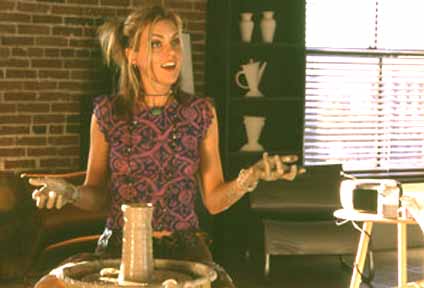Apr 13, 2025
Apr 13, 2025
Marketing such an endeavor started small—the three producers had to beg their local theater in Washington state to show it for the first time. However, with the force of word of mouth, the number of theaters has grown to 300 in six months. And it has won its share of awards. In April, it was winner at the Houston WorldFest Film Festival – 2004 of the Platinum Award, highest honor, in the category of Theatrical Feature Film/Documentary. In June, it took the Audience Award Winner for Best Hybrid Documentary at the Maui Film Festival. Then in July, it was awarded in the Sedona International Film Festival and Workshop as the Audience Choice Award for Most Thought-Provoking Film. Thought-provoking is a good thing. However, what impressed me the most was that it got down to practical matters of showing with the use of animation how additions and conditioning and aging works. This is a movie that can make a difference in one’s perceptions—it will change the way you look at the world… and yourself. Some people are using it as a therapy session, going to see it seven or eight times—cheaper than the psychiatrist couch, and probably more effective. For the scientific backup, physicists, philosophers, astronomers, biologists, neurologists and a psychic (the most articulate of the group) describe a strange new world, in which matter cannot be said to exist, even though it may appear in two places at the same time. Our minds are capable of fabricating everything that we perceive. It moves to the realm of mind-blowing. Through the course of the film, the distinction between science and religion becomes increasingly blurred, since we realize that, in essence, both science and religion describe the same phenomena. Arntz, a corporate scientist dropout turned Buddhist turned software developer turned millionaire software developer turned film director, said he always wanted to make movies. He tried Hollywood in the 1980’s but found it intimidating. Now, after a spiritual quest and with money in his pocket, he wanted to try again. He had the idea of putting together his four loves: science, spiritual thinking, movies and computers. A group of Americans schooled in both science and metaphysics has produced a movie about Quantum Physics, God, Philosophy, Psychology and Addictions.
A group of Americans schooled in both science and metaphysics has produced a movie about Quantum Physics, God, Philosophy, Psychology and Addictions.
"It started off like a little, $125,000 documentary," Arntz said. "But I kept wanting bigger things ... it grew from $125,000 to a $5 million movie, much to my surprise."
Based on his personal experience, director and writer William Arntz thinks that it is a no-brainer—people they can rewire their synapses to perceive a better world around them. The movie combines quantum physics and metaphysical thinking with an old-fashioned story in which a photographer, Amanda (played by the deaf actress, Marlee Matlin) is forced to examine her life. As her uninspired life begins to unravel, Amanda becomes more and more aware of the uncertain world of the quantum field hidden behind what we consider to be our normal, waking reality. Through her journey, Amanda realizes that by truly looking into the world and not just at it, her life will never be the same. Eventually, she learns to change her life by altering the way she thinks about herself and the world.
The new understanding of the way energy, matter, molecules and atoms work around us is brought about by a trip into matter itself portrayed on the giant screen. "Most people think the outside world just happens. We're suggesting there's a big connection between what you think inside your mind and what's happening outside," Arntz said.
To explain the science, the fictional tale is interrupted by interviews with scientists such as John Hagelin, who conducted research at the European Center for Particle Physics, and William Tiller, a Stanford University professor who spent nine years in the Westinghouse Research Laboratory.
An Indian is among the group of physicists who explain the science. Amit Goswami earned his Ph.D. from Calcutta University in theoretical nuclear physics in 1964 and has been taught physics in the U.S. for 32 years in this country, mostly at Oregon. Goswami also wrote a textbook on Quantum Mechanics that is well regarded and used. He is the author of five books, including The Self-Aware Universe, Quantum Creativity, Physics of the Soul, and The Visionary Window.
Dr. Stuart Hameroff, associate director for the Center of Consciousness Studies at the University of Arizona, and Dr. Jeffrey Satinover, a psychiatrist and former president of the C.G. Jung Foundation of New York, cover the neurology.
Metaphysics is discussed by Dr. Miceal Ledwith of the Maynooth College in Ireland and the mystic, Ramtha (a woman named JZ Knight who claims to psychically channel the 35,000 year old being).
I know any intelligent person will enjoy this thought-provoking and experiential movie.The script illustrates my point in my recent article, What Can I Do? When we serve others, we serve ourselves, for we are one.
17-Oct-2004
More by : Nancy Freeman Patchen